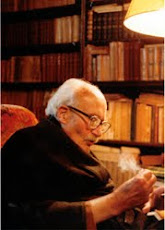For the man who believes in Providence the notion of providence explains nothing, since he believes that everything depends on it.
Escolios a un Texto Implícito: Selección, p. 370
November 22, 2010
Subscribe to:
Post Comments (Atom)
English translations of the aphorisms of Nicolás Gómez Dávila

The original Spanish is:
ReplyDeleteAl que cree en la Providencia la noción de providencia nada explica, puesto que cree que todo depende de ella.
In Textos I (Bogotá: Villegas Editores, 2002), pp. 115-135, Gómez Dávila devotes a somewhat lengthy essay to a discussion of time and epistemology, philosophies of history, and the Catholic Church's role in his own philosophy of history. In this essay, Gómez Dávila states that the many philosophies of history can be reduced to three basic schemes: providentialism, progressivism, and reductionism. He describes providentialism in the following way (at 121-122):
ReplyDelete“The most ancient scheme is the scheme of historical providentialism: an ancient and venerable, but sterile, thesis.
“For, in truth, to attribute to a divine providence, as its immediate and constant cause, the totality of history is not so much to raise an unsolvable puzzle as to propose an explanation that does not explain anything. Providentialism professes that the event occurs because providence decides it, without offering any proof of the decision other than the event that has occurred. Not being privy to divine councils, we only read in the events the decisions of providence; but the event and the decision are one and the same thing, if the event depends on the decision, and if the decision becomes known as an event. Since the event is the only actual manifestation, providence turns out to be a mere synonym for everything that has occurred. To explain by means of divine providence is, strictly speaking, to have said nothing.”
The Spanish is:
“El esquema más antiguo es el esquema del providencialismo histórico: tesis rancia y venerable, pero estéril.
“Atribuir, en verdad, a una divina providencia, como a su causa inmediata y constante, la totalidad de la historia no es tanto plantear enigmas a la conciencia ética, como proponer una explicación que nada explica. El providencialismo profesa que el hecho acontece, porque la providencia lo decide; sin alegar más prueba de la decisión que el hecho acontecido. No siendo participes de consejos divinos, sólo leemos en los hechos las decisiones de la providencia; pero hecho y decisión son una misma cosa, si el hecho depende de la decisión, y si la decisión se conoce como hecho. Siendo el hecho única presentación actual, la providencia resulta mero sinónimo de la totalidad acontecida. Explicar por medio de la divina providencia es, estrictamente, no haber dicho nada.”
See #1,592 for Gómez Dávila's description of reductionism.